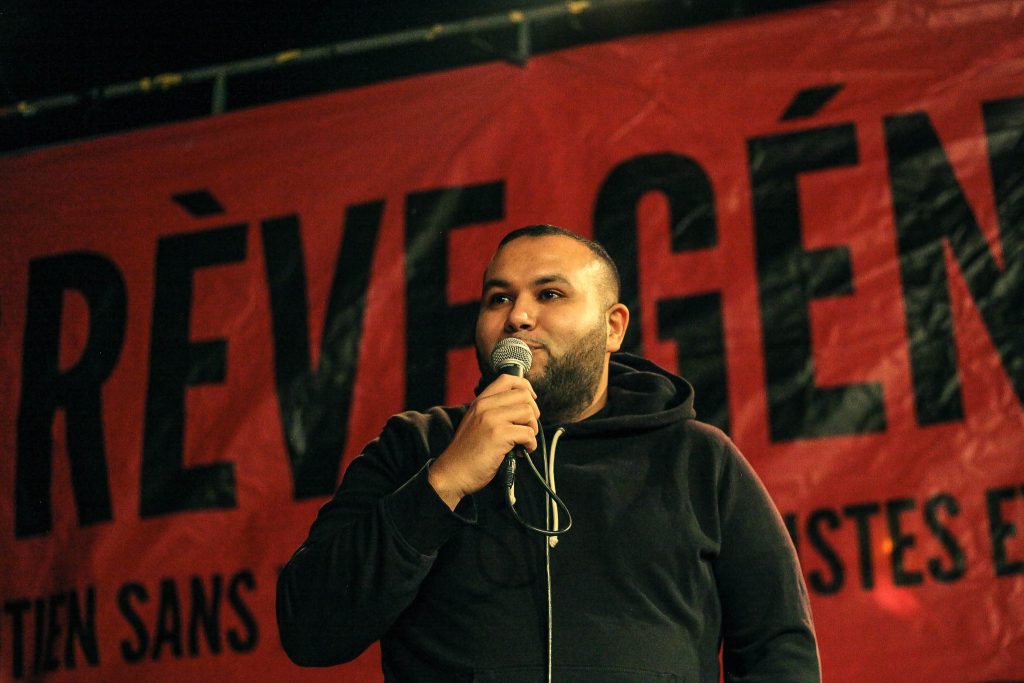The health pass system rolled out earlier this summer in France requires that people show proof of vaccination, a negative test for Covid-19, or proof of a past infection in order to attend public events, visit museums, and go to the cinema and concerts. This week, the restrictions were expanded to include entering cafés, restaurants, and many businesses, as well as ride on trains and airplanes. It is among the strictest such systems in Europe and has sparked widespread street protests, particularly among the estimated 30 percent of the French population (according to recent polls) that opposes any Covid-related restrictions on movement and access. Within this sector of the population are those who argue against the health passes in the name of “liberties” (a concept in France that is decidedly different than in the United States), as well as those who oppose vaccinations for themselves or believe others should not be forced to be vaccinated, for whatever reason (ranging from a belief there is insufficient scientific data to outright acceptance of conspiracy theories).
**
The mobilizations against the health pass proving Covid vaccination that is required for many routine activities in France, in which I’ve participated, are growing each week. At the same time, the health situation is worsening — and the government’s only answer is more repression as the state tries to blame the non-vaccinated for the slow recovery from the epidemic. It’s all part of trying to get off the hook for its own lack of a health strategy.
There is real skepticism about vaccination today, and not only among the confirmed “anti-vaxxers” and conspiracy theorists. An entire sector of the population has lost any confidence in the word of the government, and rightly so given its management of the health crisis so far. This same sector distrusts the pharmaceutical industry, which is run by big conglomerates with a financial interest in vaccine production.
On top of this legitimate mistrust there is an entire group that propagates fake news about the effectiveness of vaccines — effectiveness that is indisputable.
That’s why I decided to write a Twitter thread to review the current knowledge about the vaccine and respond to all the doubts, questions, and mistrust. Basically, this is the pedagogical work the government is incapable of doing today. And above all, it is the view of a worker, just like other workers, who is worried about the propagation of reactionary ideas in our working class. We are the premier victims of Covid-19.
First, I want to make clear that I oppose the health pass, but I support the most massive program of vaccine education possible. I myself received my two doses of the Pfizer vaccine back in May. The day after, I had a sore arm and a fever. Almost all of my relatives have been vaccinated; none had any particular post-vaccine problems. I have about 200 acquaintances — activists, colleagues, friends — who have been vaccinated with nothing more serious than a fever for two days. Among them, some received the Pfizer vaccine and others received the AstraZeneca vaccine. They include diabetics, immunocompromised people, athletes, young people, older people, and so on. The vast majority of them had a sore arm and some fatigue the next day, and some who had already suffered from Covid experienced more fever.
Many vaccine skeptics are actually misinformed or are influenced by fake news. Others doubt just how dangerous Covid-19 really is, not having experienced it directly, and therefore doubt the need to be vaccinated. I have seen Covid up close and personal. My father-in-law spent a month in intensive care before dying at the university hospital in Angers. My 17-year-old cousin, who had Type-1 diabetes, also died from Covid. I lost a 40-year-old colleague. Some of my other colleagues have even lost both their parents. In the building where I live, Covid has taken the lives of several neighbors. Dozens of my friends have lost one or more relatives. Covid has killed, and continues to kill, large numbers of people over age 60, but also people with no preexisting conditions.
Even when it doesn’t kill, Covid has long-term health effects on those who become infected. I know several people who lost their sense of smell and taste and did not regain them for several weeks. Some have yet to recover. Some are undergoing treatment for Covid-induced illnesses such as myocarditis and pulmonary embolisms. All of this leaves its mark. I have seen the ravages of Covid with my own eyes, I have seen us be counted at the entrance to the cemetery as if we were going into a nightclub, because no more than 20 people could attend the burial of a loved one they had not been able to see one last time before Covid took their lives.
Now, vaccination has proven its effectiveness against these ravages. I will try to demonstrate this with figures and concrete examples, comparing the situation of countries in which vaccination is still low and those where more than 50 percent of the population has been vaccinated, in the face of the new wave caused by the Delta variant or even the weaker Alpha variant.
Let’s begin with countries with relatively low vaccination rates, such as Russia — which is experiencing a major wave of the Delta variant. Only 17.5 percent of Russians have received two doses of a vaccine. On July 28 alone, there were 22,420 new positive cases and 798 deaths. In Brazil, where Bolsonaro plays the role of anti-vaxxer/Covid-skeptic-in-chief, the government has been forced to accelerate the pace of vaccination given the sheer scale of the new wave. With only 19.7 percent of the population vaccinated, July 27 saw 41,000 new cases and 1,333 deaths. Indonesia, which had been somewhat spared from Covid-19, has now been turned on its head by the Delta variant. The virus is wreaking havoc, especially among young people. The fully vaccinated rate in the country is only 7.6 percent, and on one day, July 31, there were 37,000 new positive cases and 1,800 deaths.
In these three countries, where the proportion of the population vaccinated is low, the curve of positive cases and the curve of deaths follow each other very closely.
Let’s move on to the countries where more than half the population is vaccinated. These countries are also facing a new wave, sometimes with numbers of cases as high as in the countries just discussed. When we look at the curves in these countries, we see that deaths decrease in direct proportion to the vaccinations that began in the spring. In the United States, there were 68,437 new positive cases on July 27, but only 375 deaths. That’s 27,000 more cases than in Brazil, but 1,000 fewer deaths. The difference is that more than 50 percent of the U.S. population is fully vaccinated. The situation is the same in the United Kingdom: on July 20, at the peak of the curves, there were 46,000 new cases and 96 deaths — 1,200 fewer deaths than in Brazil for the same number of cases. Some 57.2 percent of the British population is fully vaccinated.
This winter, before the major vaccination rounds in the United States and the United Kingdom, the situation was quite different. Prior to the U.S. vaccinations, there were 976 deaths for the same number of positive cases, compared to 375 today. In Britain, there were 1,250 deaths, compared to 96 today.
Vaccination has also had an impact in France, which has 47.5 percent of the population vaccinated. At the end of April, there were 398 deaths for 28,000 positive cases. On July 28, there were only 52 deaths for the same number of positive cases.
In the face of the new epidemic wave, the difference between countries vaccinated below 20 percent and those above 50 percent is edifying. The vaccine may not stop infections, especially with the Delta variant, but it saves lives. People are still getting sick, but as vaccination rates increase, there are fewer and fewer deaths.
Today, the new wave affects mainly people younger than 50 and those who are still not vaccinated. In England, of 80,000 cases in June, 67 percent of the positives were unvaccinated, 25 percent had received only one of the two doses, and 8 percent had received two doses. In addition, there are more and more severe cases in people in their thirties.
This is not to underestimate the possible complications that vaccines can cause. Like any drug or therapy, vaccines can have serious side effects in very marginal cases. To deny this is to lend credence to the conspiracy theorists by denying the real evidence. But serious side effects are very rare, and are mostly minimal compared to the risks of Covid-19. Covid vaccines are probably among the most closely scrutinized medical products in our history; they are distributed on a global scale; and unprecedented resources have been made available to develop them, which explains why that happened so rapidly.
It makes sense to be concerned about the speed at which they have been developed. But think about this: if all medical research had similar resources, all discoveries would happen just as quickly! Moreover, the side effects of vaccines typically occur in the days and weeks following vaccination. No vaccine has ever had recognized side effects more than three weeks after vaccination. Today, given the huge number of people vaccinated, and the time that has passed between the first tests and today’s more widespread vaccination, we have the hindsight to say with certainty that Covid-19 vaccines are safe and effective.
Faced with a virus that mutates and kills, I consider the evidence we have on the 2.5 billion human beings currently vaccinated to be convincing. This does not mean that we should have blind confidence in a pharmaceutical industry that makes health a market like any other. But the statistics are right before our eyes, and we must distinguish between biomedical innovation and the pharmaceutical industry.
What is mainly responsible for the skepticism of people towards vaccines, and even for the conspiracy and reactionary excesses to which it gives rise? It is the government, which has put the economic interests of the bosses before the health of the workers in every phase of the pandemic. And it is the private ownership of the health sector, which makes our lives an object of speculation.
This is why patents on vaccines must be lifted today, and why we must put an end to the profit-making ownership of the health sector. Workers made the world go round in the worst moments of the pandemic, were the hardest hit, and must not be the ones to pay the price for the irrationality of health crisis management under capitalism.
First published on August 6 in French in Révolution Permanente.
Translation by Scott Cooper











